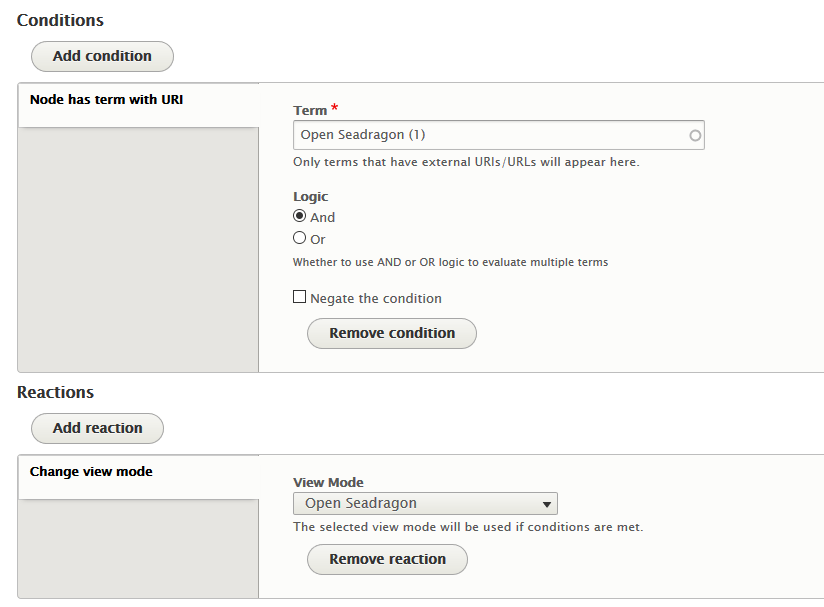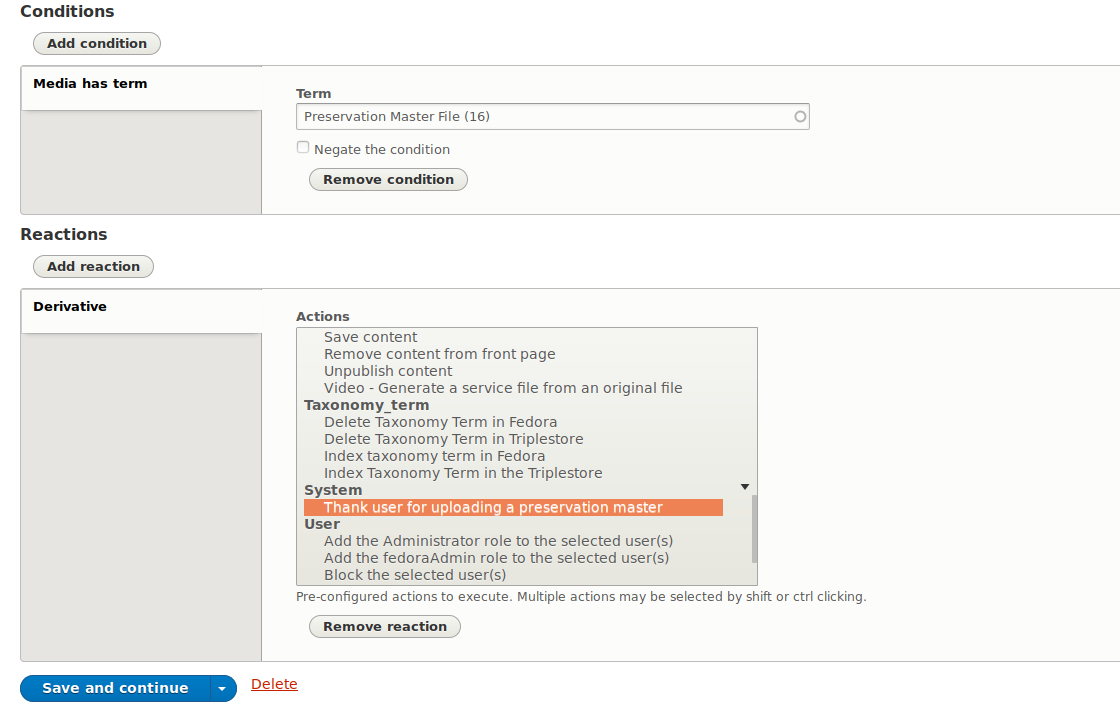Context
Context in Islandora¶
Context is a Drupal contrib module that allows configuration of "if this, then that" logic using an administrative user interface. Context defines "conditions" and "reactions" to enact the "if this [condition], then that [reaction]" logic. Some Islandora Legacy repositories use the community-contributed Islandora Context module to apply this sort of logic to Islandora objects. An example Context from Islandora Legacy is
If an object's namespace is 'customnamespace', render the block containing the right's statement "Please contact Special Collections before reusing this item".
The Context project page on drupal.org says "You can think of each context as representing a 'section' of your site", but that doesn't tell the whole story, since it gives the impression that Context is all about defining subsites. Context in Drupal 8 (and above) is much more powerful than in Drupal 7 due to how it interacts with the rest of Drupal (specifically, through Drupal 8's new plugin API). Because of this increased flexibility and power, and because Context provides a ready-made user interface for site administrators to combine conditions and reactions, Islandora uses Context to drive the logic underlying many important aspects of Islandora, including which derivatives get generated and how objects are displayed. In Islandora Legacy, many of these things are managed (and often hard-coded) within solution packs and utility modules.
An example¶
Let's look at the example of how Context can determine how an object is displayed. Drupal 8 has the idea of "view modes", which allow site builders to choose what happens when an object is viewed by the user (it has nothing to do with Drupal Views). In the node edit form for Islandora objects, there is a checkbox that, if checked, tells Drupal to render the image using the OpenSeadragon viewer:

This functionality is accomplished via the "OpenSeadragon" Context, which, as its configuration suggests, checks as its condition whether the node as the "OpenSeadragon" tag and if so, reacts by using the view mode "OpenSeadragon":

Context and actions¶
Context in Drupal 8 uses Drupal Actions to execute the "then that" part of their logic. An implication of this is some configuration options relevant to the outcome of the "then that" reaction are configured in the Action admin interface (located at admin/config/system/actions), not within the Context admin interface (located at admin/structure/context). While this makes for a clunky admin experience, the advantage is that it allows the reuse of a single piece of Drupal code in multiple Contexts.
One important group of functionality in Islandora repositories that admins might want to control is what types of media get persisted to Fedora. Islandora allows administrators to choose what types of media get persisted to Fedora and what types of media get persisted to the Drupal public file system. For example, you may want to persist your thumbnails to Fedora along with your "Preservation Master" and "Original File" files. This can be accomplished using Context.
By default, Islandora stores thumbnails in Drupal's public file system, not in Fedora. Thumbnails are automatically generated by a Context (the "Image Service File" Context to be specific), but if you want to change the file system where your thumbnails are stored to the Fedora file system, you need to change that setting in the "Image - Generate a thumbnail from a service file" Action, not in the Context that uses that action:

This configuration should be done as part of your initial Islandora setup, since there is currently no way to move thumbnails that were persisted to Drupal's public file system to Fedora, or vice versa. But, at least site admins can choose one or the other using this Action.
You can create custom Actions and then use them in Contexts. For example, if you want to present a message to the user every time they upload a media tagged as "Preservation Master File", create an Action of type "Display a message to the user" and enter your message:

Then, create a Context that uses this Action as its Reaction, and as its Condition, uses "Media has term" with a value of "Preservation Master File":

Now, when a user creates a Media and tags it as a "Preservation Master File", they will be shown the message you created in your Action:

Tips on using Islandora-specific contexts¶
Islandora provides some Conditions and Reactions that aren't available on other Drupal sites. When using them, you may find the following tips useful:
- When using the "Node has term with URI", "Media has term with URI", and "Parent node for media has term with URI" Islandora-specific Conditions, you may want to enter multiple terms to take advantage of the AND/OR logic they provide. To do so, add a comma (
,) after the first term in the autocomplete field and continue typing. - These three Conditions limit taxonomy terms that show up in their autocomplete Term field to terms that have URIs associated with them, for example from the Islandora Media Use or Islandora Models vocabularies (although any term that has a URI will appear). If you want to configure Conditions using terms that do not have a URI, you can use the contrib Term Condition module.
- Be as specific as possible in configuring your Conditions. If your Conditions seem to apply too broadly or in unexpected ways, try adding a "Content Entity Type" Condition to limit the Context to pages that render Islandora objects or media.
Increased flexibility¶
Most Islandora repository administrators will not need to alter or configure any Contexts. But since much of Islandora's underlying functionality is governed by this powerful Drupal contrib module, administrators should become comfortable using it, and Actions, to customize and refine their repositories. Also, since Islandora objects are ordinary Drupal nodes, Islandora objects can take advantage of standard Drupal 8 Context functionality out of the box.